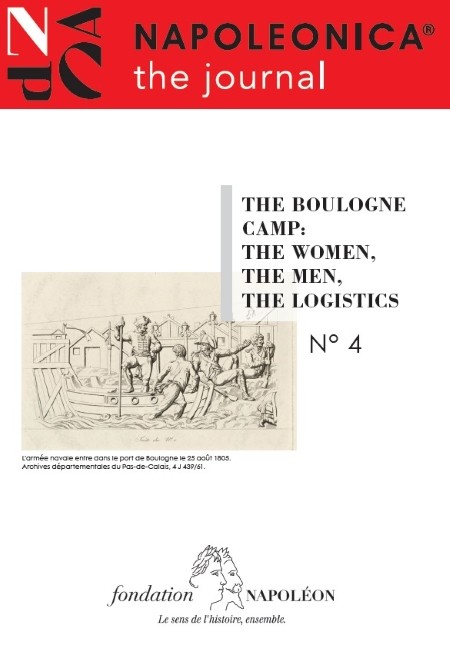Éditorial
One of the aspirations of Napoleonica® the Journal is to stimulate archival research into French history of the 19th century. It is our fervent hope that by translating French academic writing into English, the parallel tracks of French-language and English-language historiography will be brought ever closer to convergence.
The articles in the current issue were published in French in Napoleonica® La Revue in 2018 and formed part of a study day organised by the French National Institute for Preventive Archaeology, Inrap, the ville d’Étaples, and the Fondation Napoléon, at the end of 2017 under the presidency of Frédéric Lemerie and François Houdecek. Each of the essays here shows how a traditional archival and non-ideological approach can offer a wealth of relevant results, and indeed utterly new pictures. Cécile Robin first describes the archives as such and their history. Next, Chantal Prevot discusses garrison life during the Consular period in a ground-breaking account of births and marriages, showing how the Boulogne Camp (in its broadest sense) had a profound effect on the social life of the surrounding area. Here detailed study of local archives has rendered fascinating statistics. In the same way, Frédéric Lemaire’s archaeological report (performed on the back of excavations for a supermarket!) gives for the first time an almost photographic view of the castrametation of the Boulogne site. So remarkable was the construction of these ‘baraques’ that Napoleon was still talking about them to Gaspard Gourgaud on St Helena, fifteen years later. As Lemaire shows, trenches are just as good (if not better) as archives when trying to tell the story of the past. Perhaps most surprising of all the articles here is that by Sophie Muffat. For those of us mainlining on the supposed all-crushing efficiency of the state-of-the-art Grande Armée, Muffat’s story of unreasonable expectations and supply chain impatience on the part of the First Consul when faced with intractable naval infrastructure issues comes almost as a shock. We know that Napoleon always wanted to do things ‘by yesterday’ but even he was unable to break the log jam in naval procurement, nor was he able to understand why the logjam existed in the first place. As Muffat suggest, it was the sheer vastness of the undertaking that pushed the system to breaking point, and in this it somewhat resembled the unrealistic logistical expectations surrounding the ‘army of 20 Nations’ as it crossed the Niemen in 1812. The final article, on numismatics, draws again a startling picture of soldier pay and the money to be made by unscrupulous coin speculators.
All in all, we hope that this issue will encourage others to dive into the archives (whether paper or soil) in further attempts to renew the story of this remarkable period in European history. And don’t forget, it doesn’t even need to cost anything. The Fondation’s archival website, Napoleonica® Les Archives, has (inter much alia) the complete collection of the preparatory debate papers of the Napoleonic Conseil d’État. Peter Hicks
Sommaire
• From Pas-de-Calais to England: the cartographical arsenal of the imperial state secretariat, par Cécile Robin
• Building Napoleon’s flotillas: an invasion project fraught with difficulties, par Sophie Muffat
• Women at the Boulogne camp, 1803-1809: findings from the civil registries for the communes of Montreuil-sur-Mer, Étaples, Saint-Josse, Camiers, Dannes and Widehem, par Chantal Prévot
• Archaeoscopy of an invasion project: Excavation of the infantry barracks at the Montreuil army camp (1803–1805), par Frédéric Lemaire
• The numismatics of the Étaples camp. soldiers’ pay in the light of archaeological discoveries, par Thibault Cardon
• Année philologique napoléonienne 2023
• Review : Riccardo Benzoni. “Dieu lui accorde un fils” Napoleone, il re di Roma e la legittimazione della dinastia imperiale. Milan: Franco Angeli. 2022, par Ambrogio A. Caiani


